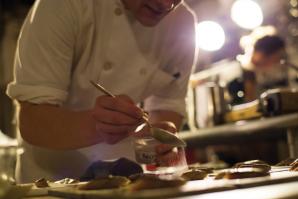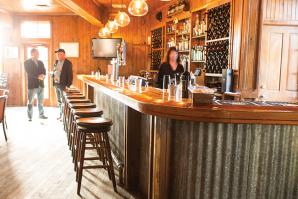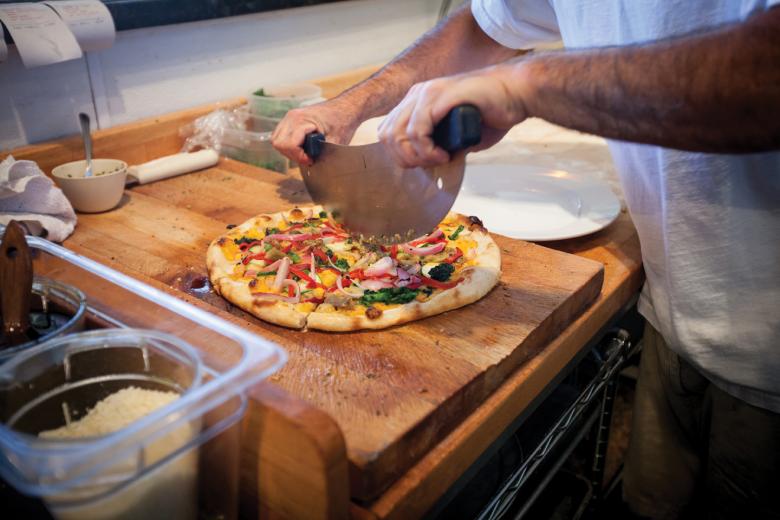In the past 13 years Rick Mahan has not only learned a lot about launching, financing, owning and staffing a business, he has also experienced first hand some of life’s toughest lessons. Today, as the well-respected proprietor of The Waterboy restaurant in midtown and One Speed pizza shop in East Sacramento, he is willing to share those lessons.
Now 52, Mahan says he knew he wanted to be a chef by the time he was 17 and washing dishes at a family restaurant in Carmichael. Not unlike numerous local restaurateur success stories, he worked his way through the trade and spent time interning at upscale Bay Area kitchens before returning to Sacramento.
In 1996, he joined forces with Ed Brown of Rubicon Brewing Co. to transform an upscale, Italian mainstay (Americo’s) into The Waterboy.
“Boy did we hear it from the 50 loyal customers Americo’s still had,” Mahan recalls. “They couldn’t believe we were shutting down the place. But it was time. One partner had passed, another moved on and a third was disinterested.”
Mahan believed he had a good track record with the regional banking industry and the Small Business Administration, having successfully partnered in the opening of three other restaurants in the area. But apparently times were changing.
“Just before getting into the Americo’s deal with Ed, I had been trying to open a new place at the Tres Hermanos location near 24th and K streets. But I couldn’t get any banks to support me. It was a rude awakening.”
Fortunately, according to Mahan, “all the bones were there” at the Americo’s location. He cleaned up all the kitchen equipment, did some very minor redesign and renovations and opened up the place. He says it cost him about $50,000 for The Waterboy’s startup, which, at the time, was his life savings.
“Once I opened Waterboy, I didn’t take a paycheck for a year, which is the stupidest thing I’ve ever done in my life,” he says.
At the time, Mahan was married with an eight-year-old daughter. For reasons he says were unrelated to the business, that marriage ended. He also had to let go of his opening chef and pastry chef, taking over those duties himself.
“I was just trying to make it work for everybody,” Mahan says. “I ended up making it not work that well for anybody. Those were some pretty lean times. Several nights I walked out with tears in my eyes because I didn’t think I was going to be able to make payroll.”
Mahan says it took five years before Waterboy was turning a profit. However, during that time, he developed a following with the all-important business lunch and dinner crowd. Waterboy’s corner of midtown (20th Street and Capitol), once part of a secluded eatery island, had burgeoned into a popular restaurant locale. The local economy was on the upsurge. And perhaps, most importantly, he had built a solid professional rapport with his staff.
Of course, nothing operates smoothly forever. Come 2007, the economy started to turn. People weren’t spending as much money on things like lunch meetings. Several restaurants stopped serving mid-day meals altogether. Regulars that had frequented Waterboy once a week were now coming in once a month.
“It can be argued either way about serving lunch,” Mahan says. “The overhead is the same for lunch and dinner, but I had a lot of loyal employees. I just couldn’t personally justify shutting down half the business.”
Instead, he opened another: One Speed pizza.
Formerly Café Milazzo, Mahan had long had his eye on the Folsom Boulevard property adjacent to the erstwhile East Sac Hardware.
“I couldn’t have approached this project at a worse time (2008),” he says. “The economy sucked. We were holding our own but still struggling a bit at Waterboy, but I had long wanted to get into the casual neighborhood pizzeria business. And I absolutely loved the location.”
Bankers did not share his enthusiasm.
“Again, I got shot down by three different banks. I was not asking for that much money. I had a good track record. Banks were simply becoming very uninterested in anything restaurant-related,” he says.
To make matters worse, Mahan notes that he and his new wife, Susan, had bought a house in east Sacramento a year earlier. By this time, like many residential properties throughout the country, the house was underwater.
“The Waterboy was doing OK, but besides my reputation, there was no collateral. Apparently, I wasn’t enough.”
He set out to prove the banks wrong. He used that reputation to lineup private investors comprised mostly of friends and loyal customers. Through two separate rounds of financing — as the cost of revamping the property grew from an initial estimation of $500,000 to nearly $900,000 — he was able to successfully finance the launch of One Speed. Doors opened in June 2009.
“As we got into the project, infrastructure costs just continued to soar. Fortunately, I had a good deal with the landlord, and my general contractor allowed me to make payments,” Mahan says. “But I couldn’t have done anything without my investors. I would have been sunk. I had to offer them 10 percent return. But I was happy to have such a deal.”
He also proudly reports that nearly four years into the financial arrangement, he has fully paid off all of his investors. And while the region is still slowly climbing out of the recession, Mahan says One Speed is turning a profit.
“There’s a reason why there are 8 million pizzerias in the U.S.,” he says. “By nature, you can focus on one thing. The costs are more controllable; it doesn’t take a great deal of trained, skilled people to run the place.”
Today, Mahan balances his time between One Speed, The Waterboy, and his wife and five-year-old daughter, Daisy. He can frequently be seen around town riding his bike (often with Daisy in tow) between the restaurants and his east Sacramento home.
“This time around, I have definitely made a commitment to balance my life between work and family,” he says. “My wife was in the restaurant business for nine years. She’s well aware that you make most of your money in the evenings. But I decided I just couldn’t work all the time. Physically and mentally I would go nuts. I won’t make that mistake again.
“Fortunately,” Mahan adds. “I have a very strong, talented and committed staff. Many of whom have been with me since the beginning.”
Recommended For You

Naturalist Nouvelle
Unearthing a new restaurant concept
Six months ago, Kevin O’Connor hit a wall. He had a good job in a good kitchen, but his body was exhausted and his passion was gone. So, at 24, he decided to step down as the chef of the now-shuttered Blackbird Kitchen & Bar and dig for a new plan.

The Sloughhouse Experience
How a local couple is revitalizing a historic eatery without a chef, a restaurant background or investors
For the new owners of the Sloughhouse Inn, the challenges of running a restaurant began when patrons started walking through the door. Apparently, management wasn’t actually planning on customers showing up.






